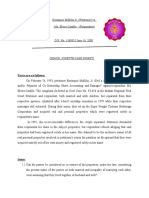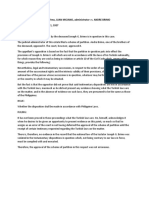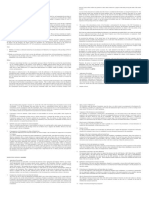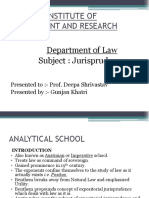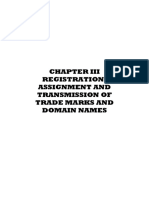Gonzales Vs Ge. Abaya
Gonzales Vs Ge. Abaya
Uploaded by
Ross LyneCopyright:
Available Formats
Gonzales Vs Ge. Abaya
Gonzales Vs Ge. Abaya
Uploaded by
Ross LyneOriginal Title
Copyright
Available Formats
Share this document
Did you find this document useful?
Is this content inappropriate?
Copyright:
Available Formats
Gonzales Vs Ge. Abaya
Gonzales Vs Ge. Abaya
Uploaded by
Ross LyneCopyright:
Available Formats
GONZALES VS. GE. ABAYA G.R. No. 164007, Aug.
10, 2006
The nature of the military justice system Coup d'etat vis-a-vis violation of the Articles of War
FACTS: On July 27, 2003 at around 1:00 a.m., more than 300 heavily armed junior officers and enlisted men of the AFP entered the premises of the Oakwood Premier Luxury Apartments on Ayala Avenue, Makati City, where they disarmed the security guards and planted explosive devices around the building. They then declared their withdrawal of support from their Commander-in-Chief and demanded that she resign as President of the Republic. After much negotiation, the group finally laid down their arms. Subsequently, an Information for coup detat was filed against them with the RTC, at the same time that they were tried at court martial for conduct unbecoming an officer. They question the jurisdiction of the court martial, contending that the RTC ordered that their act was not service-connected and that their violation of Art. 96 of the Articles of War (RA 7055) was absorbed by the crime of coup detat. ISSUE: Whether the act complained of was service-connected and therefore cognizable by court martial or absorbed by the crime of coup d'etat cognizable by regular courts
RULING: The military justice system is disciplinary in nature, aimed at achieving the highest form of discipline in order to ensure the highest degree of military efficiency. Military law is established not merely to enforce discipline in times of war, but also to preserve the tranquility and security of the State in times of war, but also to preserve the tranquility and security of the State in time of peace; for there is nothing more dangerous to the public peace and safety than a licentious and undisciplined military body. The administration of military justice has been universally practiced. Since time immemorial, all the armies in almost all countries of the world look upon the power of military law and its administration as the most effective means of enforcing discipline. For this reason, the court martial has become invariably an indispensable part of any organized armed forces, it being the most potent agency in enforcing discipline both in peace and in war. The Court held that the offense is service-connected. xxx It bears stressing that the charge against the petitioners concerns the alleged violation of their solemn oath as officers to defend the Constitution and the duly-constituted authorities. Such violation allegedly caused dishonor and disrespect to the military profession. In short, the charge has a bearing on their professional conduct or behavior as military officers. Equally indicative of the serviceconnected nature of the offense is the penalty prescribed for the same dismissal from the service imposable only by the military court. Such penalty is purely disciplinary in character, evidently intended to cleanse the military profession of misfits and to preserve the stringent standard of military discipline.
You might also like
- Baylosis DigestedDocument2 pagesBaylosis DigestedMaria Danice Angela100% (1)
- Due Diligence AgreementDocument2 pagesDue Diligence AgreementShinichi KudohNo ratings yet
- 2 Quiambao Vs BambaDocument6 pages2 Quiambao Vs BambaLimberge Paul CorpuzNo ratings yet
- 20th Century Fox Film Corporation V CADocument2 pages20th Century Fox Film Corporation V CAKrys Martinez100% (1)
- Double Jeopardy PaperDocument1 pageDouble Jeopardy PaperStephanie Praise FernandezNo ratings yet
- People vs. Talaro Et Al (March 20, 2012) GR #175781Document11 pagesPeople vs. Talaro Et Al (March 20, 2012) GR #175781mque12No ratings yet
- Basa Vs MercadoDocument4 pagesBasa Vs MercadoryuseiNo ratings yet
- The Rule of Law in The West Philippine Sea DisputeDocument12 pagesThe Rule of Law in The West Philippine Sea DisputeEdwino Nudo Barbosa Jr.No ratings yet
- Case Digest No.2 5th AssignmentDocument3 pagesCase Digest No.2 5th Assignmentjeliena-malazarteNo ratings yet
- Macariola Vs Asuncion FullDocument16 pagesMacariola Vs Asuncion FullJA BedrioNo ratings yet
- Appellant, vs. Shell Company of The Philippine Islands, LTD., Defendant-Appellee, Yek Hua TradingDocument2 pagesAppellant, vs. Shell Company of The Philippine Islands, LTD., Defendant-Appellee, Yek Hua TradingKevin Patrick Magalona DegayoNo ratings yet
- People v. Santayana, 74 SCRA 25 (1976) PDFDocument3 pagesPeople v. Santayana, 74 SCRA 25 (1976) PDFJessica Melle GaliasNo ratings yet
- California Clothing, Inc., Et. Al. vs. QuiñonesDocument6 pagesCalifornia Clothing, Inc., Et. Al. vs. QuiñonesWeddanever CornelNo ratings yet
- In Re ShoopDocument31 pagesIn Re ShoopNenita Wella Jose AguilarNo ratings yet
- Schneckenburger v. Moran, 63 Phil. 249 (1936)Document8 pagesSchneckenburger v. Moran, 63 Phil. 249 (1936)Kristell FerrerNo ratings yet
- ConstiDocument46 pagesConstiIkkinNo ratings yet
- G.R. No. L-9726 US V.S. TaylorDocument5 pagesG.R. No. L-9726 US V.S. TaylorNaezel BaronNo ratings yet
- Tanada Vs AngaraDocument2 pagesTanada Vs AngaraAgnes LintaoNo ratings yet
- G.R. No. 223395, December 04, 2018Document39 pagesG.R. No. 223395, December 04, 2018Kristine MagbojosNo ratings yet
- People v. Abarca, 153 SCRA 735Document5 pagesPeople v. Abarca, 153 SCRA 735Emmylou Shayne LayogNo ratings yet
- Supreme Court: Bishop and O'Brien For Appellant. Attorney-General Wilfley For AppelleeDocument5 pagesSupreme Court: Bishop and O'Brien For Appellant. Attorney-General Wilfley For AppelleeAmicus CuriaeNo ratings yet
- Demetria Vs AlbaDocument4 pagesDemetria Vs AlbaAngel Lasquite VelascoNo ratings yet
- 002 Macariola v. AsuncionDocument3 pages002 Macariola v. AsuncionKathrinaFernandezNo ratings yet
- Collector v. Campos RuedaDocument2 pagesCollector v. Campos RuedaAldrin Karl SeguradaNo ratings yet
- Testate Estate vs. Christensen Garcia GR No. L-16749Document7 pagesTestate Estate vs. Christensen Garcia GR No. L-16749Jacinto Jr Jamero100% (1)
- 17 - US v. DIAZ CONDEDocument2 pages17 - US v. DIAZ CONDEmark anthony mansuetoNo ratings yet
- Pedro Abad Santos, W. H. Booram, Solicitor-General Harvey,: 150 Philippine Reports AnnotatedDocument6 pagesPedro Abad Santos, W. H. Booram, Solicitor-General Harvey,: 150 Philippine Reports AnnotatedReyna RemultaNo ratings yet
- 16Pp v. Lo-Lo & Saraw, 43, Phil. 19 (1992)Document4 pages16Pp v. Lo-Lo & Saraw, 43, Phil. 19 (1992)Digesting Facts100% (1)
- Aisporna V CADocument3 pagesAisporna V CAChristiane Marie BajadaNo ratings yet
- 9 People v. Benito y Restubog20160919-3445-Ba568yDocument7 pages9 People v. Benito y Restubog20160919-3445-Ba568yCarlota Nicolas VillaromanNo ratings yet
- 12 Vargas Vs KilclineDocument4 pages12 Vargas Vs KilclinemilotNo ratings yet
- Cui V Arellano UnivDocument2 pagesCui V Arellano UnivRenesmé100% (1)
- The Judicial System (Pre-Spanish)Document1 pageThe Judicial System (Pre-Spanish)Jude LeinNo ratings yet
- 2 Anti Fencing - Cahulogan Vs PeopleDocument7 pages2 Anti Fencing - Cahulogan Vs PeopleRichard TenorioNo ratings yet
- Kilosbayan V ErmitaDocument16 pagesKilosbayan V Ermitaalexis_beaNo ratings yet
- DIMAYUGA vs. RUBIADocument2 pagesDIMAYUGA vs. RUBIAKristine CentinoNo ratings yet
- Eustaquio Mallilin vs. Ma. Elvira CastilloDocument2 pagesEustaquio Mallilin vs. Ma. Elvira CastilloJODETTE SIMONNo ratings yet
- Amores vs. HretDocument5 pagesAmores vs. HretMitch LimNo ratings yet
- Benedicto Vs CaDocument2 pagesBenedicto Vs CaLev Alvarez100% (1)
- Testate Estate of Joseph G. Brimo, JUAN MICIANO, Administrator vs. ANDRE BRIMO G.R. No. L-22595 November 1, 1927Document1 pageTestate Estate of Joseph G. Brimo, JUAN MICIANO, Administrator vs. ANDRE BRIMO G.R. No. L-22595 November 1, 1927ChariNo ratings yet
- G.R. No. L-1960Document4 pagesG.R. No. L-1960MANUEL MARIMLANo ratings yet
- 210841-2017-Department of Public Works and Highways V.20220205-11-1oo5z1pDocument30 pages210841-2017-Department of Public Works and Highways V.20220205-11-1oo5z1pSalcedo YehoNo ratings yet
- Dilemna 4Document3 pagesDilemna 4dennisgdagoocNo ratings yet
- Francisco vs. HREPDocument3 pagesFrancisco vs. HREPCharnemNo ratings yet
- 001 - Asaali V Commissioner of CustomsDocument1 page001 - Asaali V Commissioner of CustomsPatrick ManaloNo ratings yet
- Marantan Diokno (G.R. No. 205956, February 12, 2014) CleanDocument6 pagesMarantan Diokno (G.R. No. 205956, February 12, 2014) CleanClarinda MerleNo ratings yet
- Constitutional Law CasesDocument3 pagesConstitutional Law CasesApple Gee Libo-onNo ratings yet
- Benedicto V CADocument3 pagesBenedicto V CAOzOzNo ratings yet
- Justice Leonen Dissenting Opinion On Lagman CaseDocument2 pagesJustice Leonen Dissenting Opinion On Lagman CaseJeremiah BantigueNo ratings yet
- 83 SCRA 595 PNB Vs PabalanDocument4 pages83 SCRA 595 PNB Vs PabalanMj Garcia0% (1)
- Theofilus B. Steele, For Appellant. Office of The Solicitor-General Araneta, For AppelleeDocument2 pagesTheofilus B. Steele, For Appellant. Office of The Solicitor-General Araneta, For AppelleeMarie Claire T. InductivoNo ratings yet
- Cases 1-4Document4 pagesCases 1-4Ysabelle GarciaNo ratings yet
- 6 Ysidoro v. People (2012)Document2 pages6 Ysidoro v. People (2012)ABbo HernandezNo ratings yet
- Lagman Vs MedialdeaDocument5 pagesLagman Vs MedialdeaRossa Marie R. Rivera - SortigosaNo ratings yet
- 2 in Re SycipDocument4 pages2 in Re SycipKCCNo ratings yet
- Jimenez v. Cabangbang (Aug. 3, 1966) Jimenez V CabangbangDocument8 pagesJimenez v. Cabangbang (Aug. 3, 1966) Jimenez V CabangbangRaymondNo ratings yet
- Gatmaytan, Chapter 5Document23 pagesGatmaytan, Chapter 5DanielleNo ratings yet
- G.R. No. 4963 (US V Go Chico)Document5 pagesG.R. No. 4963 (US V Go Chico)KhiarraNo ratings yet
- Challenges and alternatives towards peacebuilding: A rural development perspectiveFrom EverandChallenges and alternatives towards peacebuilding: A rural development perspectiveNo ratings yet
- Gonzales V AbayaDocument2 pagesGonzales V AbayaMichelle Montenegro - Araujo100% (3)
- Consti CaseDocument5 pagesConsti CaseRoss LyneNo ratings yet
- Veterans Federation Party Vs ComelecDocument1 pageVeterans Federation Party Vs ComelecRoss LyneNo ratings yet
- VERA vs. AvelinoDocument1 pageVERA vs. AvelinoFrancis B JandogNo ratings yet
- Velmonte vs. Belmonte (Case Digest)Document1 pageVelmonte vs. Belmonte (Case Digest)Vanz AsoqueNo ratings yet
- Us VS PonsDocument1 pageUs VS PonsRoss LyneNo ratings yet
- Trillanes VS PimentelDocument2 pagesTrillanes VS PimentelRoss LyneNo ratings yet
- Tobias Vs ComelecDocument1 pageTobias Vs ComelecRoss LyneNo ratings yet
- Sema Vs COMELEC PDFDocument2 pagesSema Vs COMELEC PDFHerzl Hali V. HermosaNo ratings yet
- Tolentino Vs Secretary of FinanceDocument2 pagesTolentino Vs Secretary of FinanceRoss Lyne100% (2)
- Secretary of Justice Vs LantionDocument1 pageSecretary of Justice Vs LantionRoss LyneNo ratings yet
- Pja VS PradoDocument1 pagePja VS PradoRoss LyneNo ratings yet
- Sarmiento VS MisonDocument1 pageSarmiento VS MisonRoss LyneNo ratings yet
- Pimentel Vs Exec Secretary ErmitaDocument2 pagesPimentel Vs Exec Secretary ErmitaRoss LyneNo ratings yet
- Senate Vs ErmitaDocument2 pagesSenate Vs ErmitaRoss Lyne100% (2)
- Sampayan VS DazaDocument2 pagesSampayan VS DazaRoss LyneNo ratings yet
- Matibag Vs BenipayoDocument3 pagesMatibag Vs BenipayoRoss Lyne67% (3)
- Macias V ComelecDocument1 pageMacias V ComelecRoss LyneNo ratings yet
- Morales VS SubidoDocument2 pagesMorales VS SubidoRoss Lyne100% (1)
- Montejo VS ComelecDocument1 pageMontejo VS ComelecRoss LyneNo ratings yet
- 6-3 Mejoff vs. Director of Prisons, 90 Phil 70 1952Document2 pages6-3 Mejoff vs. Director of Prisons, 90 Phil 70 1952Reginald Dwight FloridoNo ratings yet
- Lung Center Vs QCDocument1 pageLung Center Vs QCRoss LyneNo ratings yet
- Complaint Torts SampleDocument5 pagesComplaint Torts SampleCzaraine Dy33% (3)
- Illegal Use of Alias 1. REVELINA LIMSON vs. Eugenio Juan GonzalesDocument2 pagesIllegal Use of Alias 1. REVELINA LIMSON vs. Eugenio Juan GonzalesDawn Jessa Go50% (2)
- League of Cities vs. COMELEC (Aug 2010)Document3 pagesLeague of Cities vs. COMELEC (Aug 2010)LanNo ratings yet
- JurisprudenceDocument10 pagesJurisprudenceArhum KhanNo ratings yet
- Province of Cebu Vs IAC DIGESTDocument2 pagesProvince of Cebu Vs IAC DIGESTJay Ribs100% (3)
- Garcia V.calalimanDocument6 pagesGarcia V.calalimanJie JessNo ratings yet
- C-M-O-G-, AXXX XXX 275 (BIA July 31, 2017)Document18 pagesC-M-O-G-, AXXX XXX 275 (BIA July 31, 2017)Immigrant & Refugee Appellate Center, LLCNo ratings yet
- Prosecutor Leo C. Tabao v. Judge Frisco T. Lilagan and Sheriff IV Leonardo V. AguilarDocument2 pagesProsecutor Leo C. Tabao v. Judge Frisco T. Lilagan and Sheriff IV Leonardo V. AguilarDaniela Sandra AgootNo ratings yet
- Missouri Marijuana Legalization BillDocument3 pagesMissouri Marijuana Legalization BillMarijuana Moment50% (2)
- Del Mar vs. PvaDocument1 pageDel Mar vs. PvaRoss LyneNo ratings yet
- Parents Consent For Band CompetitionDocument1 pageParents Consent For Band CompetitionGlydel Mae Villamora - SaragenaNo ratings yet
- Sale CertificateDocument3 pagesSale CertificateJuhi Awasthi50% (2)
- United States District Court For The Western District of Washington Seattle DivisionDocument3 pagesUnited States District Court For The Western District of Washington Seattle DivisionEquality Case FilesNo ratings yet
- PUBLIC CORPORATION - Other Corporate PowersDocument22 pagesPUBLIC CORPORATION - Other Corporate PowersMaureen Joanne Aguila CoNo ratings yet
- UNDERTAKING Impounded VehicleDocument1 pageUNDERTAKING Impounded Vehiclec4382543r100% (1)
- VP Pharma Hospital Healthcare Compliance in Atlanta GA Resume Daniel CrumbyDocument3 pagesVP Pharma Hospital Healthcare Compliance in Atlanta GA Resume Daniel CrumbyDanielCrumbyNo ratings yet
- ResolutionDocument5 pagesResolutionJulius Harvey Prieto BalbasNo ratings yet
- 125 CRPCDocument6 pages125 CRPCpragati100% (1)
- RTI TemplateDocument3 pagesRTI Templatepavan6754100% (1)
- Affidavit of UndertakingDocument2 pagesAffidavit of UndertakingRobert Alexander QuinnNo ratings yet
- 2017 Crim 1 DlsuDocument16 pages2017 Crim 1 DlsuDenise GordonNo ratings yet
- Bar Treaty 1947Document12 pagesBar Treaty 1947Redza100% (1)
- House Hearing, 112TH Congress - Congressional-Executive Commission On China Annual Report 2012Document290 pagesHouse Hearing, 112TH Congress - Congressional-Executive Commission On China Annual Report 2012Scribd Government DocsNo ratings yet
- Registration, Assignment and Transmission of Trade Marks and Domain NamesDocument48 pagesRegistration, Assignment and Transmission of Trade Marks and Domain NamesRobin SinghNo ratings yet
- Challenges Facing Criminal Justice System in Relation To Witness Protection in KenyaDocument5 pagesChallenges Facing Criminal Justice System in Relation To Witness Protection in KenyaIOSRjournalNo ratings yet
- Philippine CJSDocument56 pagesPhilippine CJSJude Tyrone Ocampo100% (4)
- (Chan) People v. Del RosarioDocument1 page(Chan) People v. Del RosarioLibay Villamor IsmaelNo ratings yet
- Brief - PetitionerDocument71 pagesBrief - PetitionerLaw of Self Defense100% (1)
- 6:13-cv-01834 DecisionDocument26 pages6:13-cv-01834 DecisionEquality Case FilesNo ratings yet




































